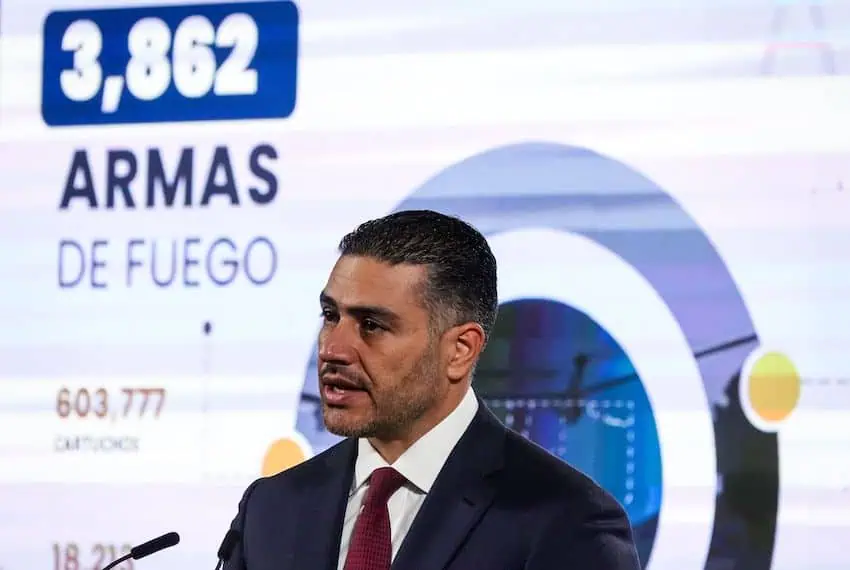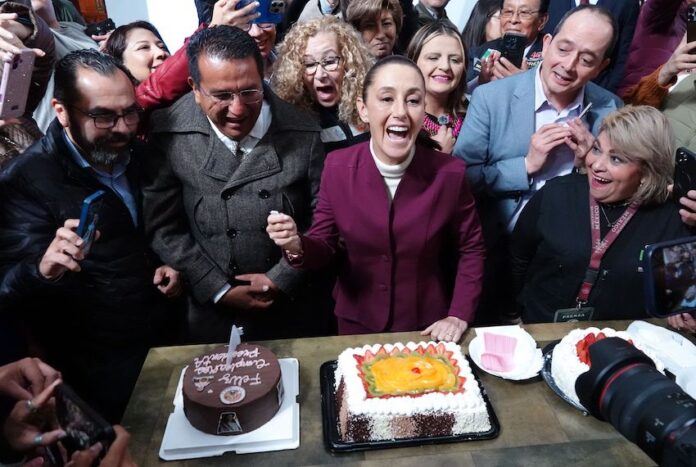Reporters broke into a rendition of the Mexican birthday song “Las Mañanitas” when President Claudia Sheinbaum appeared in the Treasury Hall of the National Palace for her Tuesday morning press conference.
Sheinbaum, born in Mexico City on June 24, 1962, celebrates her 63rd birthday — and first as president — on Tuesday.
Al inicio de la mañanera, reporteros le cantaron “Las Mañanitas” a Claudia Sheinbaum (@Claudiashein) por su cumpleaños número 63.
“Un año más vieja, pero la juventud se lleva en el corazón”, bromeó. pic.twitter.com/5AesPVkl14
— Emeequis (@emeequis) June 24, 2025
“Thank you very much,” she told reporters.
“Now, at this age, there is no need for birthdays,” Sheinbaum said.
“… A year older, but what’s important is the youth in one’s heart,” she said.
At the end of her press conference, Sheinbaum shared cake with the scores of reporters and other people in attendance.
More than 1,200 people arrested for ‘high-impact crimes’ in past 2 weeks
Early in the president’s press conference, Security Minister Omar García Harfuch provided an update on “the most recent advances” in security as a result of the implementation of the National Security Strategy.
Between June 10 and 22, García Harfuch said that authorities:
- Arrested 1,233 people for high-impact crimes, such as murder and extortion, including 22 “priority targets.”
- Seized around 8 tonnes of drugs.
- Dismantled 48 clandestine drug laboratories.
- Seized more than 1.8 million liters of fuel.
Between Oct. 1, 2024, when Sheinbaum and the current government took office, and June 22, García Harfuch said that authorities:
- Arrested 24,652 people for high-impact crimes.
- Seized 178 tonnes of drugs “and more than 3 million fentanyl pills.”
- Confiscated 12,736 firearms.
- Dismantled 1,150 clandestine drug laboratories across 21 states.

Sheinbaum: Mexico not a safe third country, but accepts deportees for ‘humanitarian reasons’
A reporter noted that the United States Supreme Court ruled on Monday that the U.S. government can deport people to “third countries,” i.e., countries other than their own.
Reuters reported that the ruling cleared the way for the Trump administration to “resume deporting migrants to countries other than their own without offering them a chance to show the harms they could face.”
Asked whether Mexico had “accepted the possibility” of being a safe third country or receiving non-Mexican deportees, Sheinbaum responded:
“No. We have not accepted being a third country. If there is a [non-Mexican] migrant that is transferred to national territory, for humanitarian reasons, we have to receive him or her and send him or her to their country of origin if it is the wish of this person.”
Sheinbaum said that the United States has “agreements with practically all countries” that allow it to send deportees “directly” to their nation of origin.
“Therefore, passage through Mexico is not required,” she said.
Sheinbaum noted, however, that Mexico has received over 5,000 non-Mexican deportees from the United States since Donald Trump began his second term as U.S. president in January.
“Since Jan. 20, 65,475 people have arrived to our country: 59,747 Mexicans and 5,728 foreigners,” she said.
“What is done in these cases? They are welcomed [to Mexico], it is seen whether they want to go to their country of origin. If that is the case, they are transferred. If it isn’t, we look for the way to incorporate them [into Mexican society],” Sheinbaum said.
She stressed that Mexico has not signed any agreement with the United States to be a safe third country and asserted it wouldn’t do so.
‘Growth without well-being is not development’
In response to a question about economic growth data, Sheinbaum said that GDP growth is not the only way to measure how an economy is performing.
“No one says we shouldn’t grow, but growth without well-being is not development,” she said a day after the national statistics agency INEGI reported that the Mexican economy grew 0.5% in April compared to the previous month and 1.4% in annual terms.
“So taking … growth of gross domestic product as the indicator of success in the economy is very limited,” Sheinbaum said.
She subsequently noted that the Mexican economy contracted in 2020 due to the pandemic, and growth was “moderate” during the subsequent years of the previous government.
“How do the neoliberals explain that under that scheme, 11 million people came out of poverty [in Mexico]?” Sheinbaum asked, citing World Bank data for the period between 2018 and 2022.
Report: Mexico’s poverty reduction policies outperform all 37 OECD member countries
Under the current government, and during the previous administration led by Andrés Manuel López Obrador, redistribution of wealth has taken place, “something that there wasn’t before,” the president said.
“The single fact that there is [a law guaranteeing an annual minimum] wage increase above inflation has to do with a system of redistribution,” Sheinbaum said.
She added that at “the heart” of the government’s doctrine of “Mexican Humanism” is the “great phrase”: ‘For the good of all, the poor first.'”
“That is what we didn’t have before, but [now] it’s a different economic model in which public resources help investment and help well-being and recognize the rights of the people of Mexico,” Sheinbaum said.
By Mexico News Daily chief staff writer Peter Davies ([email protected])
